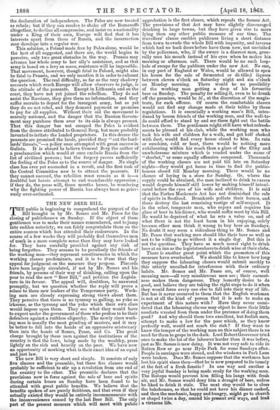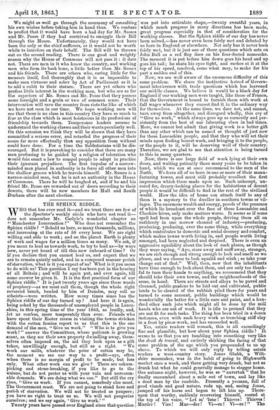THE NEW BEER BILL.
THE public is beginning to comprehend the purport of the Bill brought in by Mr. Somes and Mr. Pease for the closing of publichouses on Sunday. If the object of these gentlemen was to make their names remembered, and to jump into sudden notoriety, we can fairly congratulate them on the entire success which has attended their endeavours. In the course of a few weeks they will probably find themselves men of mark in a more complete sense than they may have looked for. They have carefully provided against any risk of being forgotten. They assume to be peculiarly the friends of the working man—they represent constituencies in which the working classes predominate, and it is to these that they appeal for judgment on the measure they propose. Placards have been largely circulated, if not by Mr. Somes and his friends, by persons of their way of thinking, calling upon the poor to read the new " Beer Bill," and petition the Legisla- ture in its favour. The appeal will, doubtless, be answered promptly, but we question whether the reply will prove a solace to these new leaders of the Temperance party. Work- ing men are already expressing strong views about them. They perceive that there is no tyranny so galling, no yoke so irksome, as the tyranny and the yoke which their own class would impose upon them. They see what they would have to expect under the government of those who profess to be their defenders against a ruthless oligarchy. The newly risen work- ing man is usually the most grinding of masters, and it may be better to fall into the hands of an oppressive aristocracy than into the hands of Somes, Pease, and Co. The great charge brought by these men against ihe institutions of the country is that the laws, being made by the wealthy, press lightly on the rich and heavily on the poor. We have now an opportunity of marking what is their exact idea of an equal and just law.
The new Bill is very short and simple. It consists of only five clauses and the preamble, but these five _clauses would probably be sufficient to stir up a revolution from one end of the country to the other. The preamble declares that the provisions now in force against the sale of beer and spirits during certain hours on Sunday have been found to be attended with great public benefits. We believe that the benefits spoken of are purely fictitious, and that even if they actually existed they would be entirely incommensurate with the inconveniences caused by the last Beer Bill. The only part of the present measure which will meet with public approbation is the first clause, which repeals the former Act. The provisions of that Act may have slightly discoura$ed drinking in large towns, but they have given rise to more lying than any other public measure of our time. The travellers' clause enables publicans living a short distance from town to evade the whole Bill with impunity, and taverns which had no back doors before have them now, not unvisited by the policeman, who, if the owner is a discreet man, gene- rally uses his mouth instead of his eyes when he makes his morning or afternoon call. There would be no such loop- hole of escape for the publican under the new Act. No one, in any part of England or Wales, would be allowed to open his house for the sale of fermented or distilled liquors. between eleven o'clock on Saturday night and six o'clock on Monday morning. There would be no possibility of the working man getting a drop of his favourite beer on Sunday. The penalty for selling it, even to be drunk off the premises, would be 51., at the discretion of the magis- trate, for each offence. Of course the comfortable classes would not find any change made at their tables by these regulations. It is essentially a working man's Bill, intro- duced by bosom friends of the working man, and the well-to- do could afford to stand by and see them fight out the battle between them. The gentleman might still have what refresh- ments he pleased at his club, while the working man who took his wife and children for a walk, and got half choked with dust, would find every house closed to him. In rain or sunshine, cold or heat, there would be nothing more exhilarating within his reach than a glass of the filthy and unwholesome mixture which is vended under the name of "sherbet," or some equally offensive compound. Thousands of the working classes are not paid till late on Saturday nights—they would get home in time to find the public- houses closed till Monday morning. There would be no chance of laying in a store for Sunday. Or, where the supply could be obtained, the man inclined to drink to excess would degrade himself still lower by making himself intoxi- cated before the eyes of his wife and children. It is said that the Forbes Mackenzie Act has not diminished the sale of spirits in Scotland. Drunkards pollute their homes, and there destroy the last remaining vestige of self-respect. It is the sober, temperate man, who enjoys and requires his glass of beer to his dinner, who would suffer most by this Bill. He would be deprived of what he sets a value on, and of what there is not the least harm in his enjoying, solely because other men think it wrong to buy beer on Sundays. No doubt it may seem a ridiculous thing to Mr. Somes and Mr. Pease that working men should like their beer so well as not to be willing to go without it a single day. But this is not the question. They have as much moral right to drink beer at an inn as the legislatorshave to drink wine at their clubs.
There is another great point which the promoters of this measure have overlooked. We should like to know how long they suppose the labouring classes would submit meekly to this utterly uncalled-for interference with their ordinary habits. Mr. Somes and Mr. Pease are, of course, well meaning men—all very mischievous men are ; their earnest- ness makes them dangerous. They honestly desire to do good, and believe they are taking the right steps to do it when they would force every one else to fall into their way of life_ Buthas it never occurred to them that the English workman is not at all the kind of person that it is safe to make an experiment of this nature with ? Have they never consi- dered that the labouring classes may object to have their little comforts wrested from them under the pretence of doing them. good? And why should these two excellent, but foolish men, attempt to make a law for the poor which, as they know- perfectly well, would not reach the rich ? If they want to know the temper of the working man on this subject there is no need for them to grope in the dark. Lord Robert Grosvenor tried once to make the lot of the labourer harder than it was before„ just as Mr. Somes is now doing. It was not very safe to ride in Rotten Row or go near Hyde Park for some Sundays after. People in carriages were stoned, and the windows in Park Lave were broken. Does Mr. Somes suppose that the workman. has. lost his spirit since then—that he is now prepared to lie tamely at the feet of a fresh fanatic ? In one way and another a very joyful Sunday is being made ready for the working man. The Bishops would prevent him filling his lungs with fresh air, and Mr. Somes would deny him a draught of beer, unless he liked to drink it stale. The next step would be to close the bakehouses, so that he could not have his dinner cooked,. and then the mechanic, happy and hungry, might go to church or chapel twice a day, amend his present evil ways, and lead a virtuous life.
We might as well go through the ceremony of consulting his own wishes before taking him in hand thus. We venture to predict that it would have been a bad day for Mr. Seines and Mr. Pease if they had contrived to smuggle their Bill through the House. Unfortunately, they would not have been the only or the chief sufferers, or it would not be worth while to interfere on their behalf. The Bill will be thrown out on the second reading. There is one good and weighty reason why the House of Commons will not pass it : it dare not. There are men in it who know the country, and working men who form its back bone, a little better than Mr. Somas and his friends. There are others who, caring little for the measure itself, feel thoroughly that it is as impossible to make men virtuous and sober by Act of Parliament as it is to add a cubit to their stature. There are yet others who profess little interest in the working man, but who are so far the superiors of Mr. Somes and Mr. Pease that they possess some foresight and a grain or two of common sense. Their intervention will save the country from riots the like of which we have not seen in our time. We hope working men will see that there is no class in this country they have so much to fear as the class which is most boisterous in its professions of friendship towards them. Temperance leaders assume to understand the working classes and their wants peculiarly well. On this occasion we think they will be shown that they have committed a serious error, and retarded the progress of their cause far more effectually than any opposition from without could have done. For a time the Sabbatarians will be dis- couraged. But it is provoking to consider that there are many men professing to be guided by a religion of toleration who would fain enact a law to compel people to adopt in practice their ignorant prejudices. The first impulse of a narrow- minded man placed in authority is to force all other men into the shallow groove which he travels himself. Mr. Somes is a narrow-minded man, but he is not an authority in the House of Commons. There be will bo laughed at, and if he and his friend Mr. Pease are rewarded out of doors according to their deserts, there will be new members for Hull and South Durham after the next election.































 Previous page
Previous page